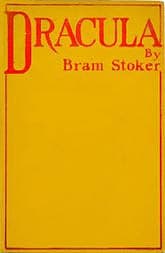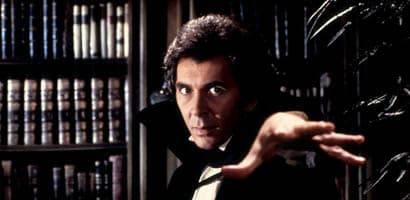Dracula
Critique • Quotes • Text • Dracula at the movies
 First edition
First editionFirst publication
1897
Literature form
Novel
Genres
Literary, fantasy
Writing language
English
Author's country
England
Length
Approx. 180,000 words

Frank Langella marks the return of the romantic Dracula in 1979.
Dracula, my love
Dracula (1979): Film, 109 minutes; director John Badham; writer Hamilton Deane, John L. Balderston, W.D. Richter; featuring Frank Langella, Laurence Olivier, Donald Pleasance, Kate Nelligan
The major Dracula movies that started coming out in the latter 1900s are quite different than those that went before. While the early Universal films were gothic horror flicks and the Hammer films brought more intelligence to the genre, later films would try with varying success to delve psychologically into what lies behind the horror.
The joint U.S.-British production of Dracula in 1979, for example, obviously sees it as a story of romantic possession. The iconic shot in this film is of a dashing, young Frank Langella, hair and cape streaming behind him, breaking into the bedroom of his female victim for an evening of passionate and bloody love.
In some ways this can be seen as an updating of the Lugosi version of 1931. And, sure enough, the screenplay is based on the same Deane-Balderston play. Like Lugosi, Langella is reprising on screen a role he played to acclaim on Broadway.
A few changes are made, however. Harker never goes to Transylvania. The action starts with Dracula arriving by ship in Yorkshire, England. The geography is updated and the count is now said to be from Romania—though his sultry voice is without an East European accent.
Names also get switched around. In England his first victim, Mina, is Van Helsing's daughter. His second intended, Lucy, is Dr. Seward's daughter, as well as Jonathan Harker's fiancée.
Van Helsing, played wearily by Laurence Olivier no less, is not much of a nemesis for Dracula either. For one thing he seems to have no prior knowledge of such paranormal phenomena, as Bram Stoker's Van Helsing does. Rather he looks it all up in an encyclopedia. In the end it is left to Harker—in most other versions the hapless cast-aside lover—to deliver the final blow.
Or does he? The ending is ambiguous, with Dracula defeated but seemingly escaping. And his lover Lucy is left with a smile on her lips.
Dracula (Frank Langella) makes his seductive midnight entrance in 1979's Dracula.
This Dracula is a tragic love story, the closest to date that any serious adaptation comes to sympathizing with the vampire's point of view. Langella's Dracula is vital, potent, and even slightly pathetic as he attempts to find a mate to live through the centuries with, hoping to raise her to live with him on another plane, high above mere mortals upon whom they will feast.
Their coming together on that fateful night is an explosion of red heat. And his demise (if it is a demise) comes in the burning red light of a sunrise.
The period of this film is also moved ahead a few years, which allows the use of early motor vehicles in the chase scenes. But Dracula remains a Gothic horror with great sweeping camera work, ghostly atmosphere and grandly romantic acting in the title role.
— Eric
Critique • Quotes • Text • At the movies
1922, 1931, 1936–1945, 1958, 1960–1974, 1979, 1979–1995, 1992, 2000, 2000, 2006, 2023

